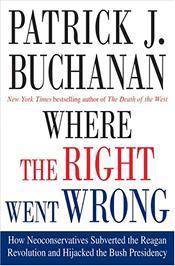With Bush’s 51 percent victory, Colin Powell’s departure and the purge at CIA, many on the Old Right seem sunk in Bunyan’s Slough of Despond. They assume the neoconservatives are now free to pursue war without end.
Yet, six weeks have now passed since Nov. 2, and there is as yet no conclusive evidence George Bush is looking to widen the war in Iraq or launch wars on other axis-of-evil nations. Consider:
With the recapture of Fallujah, U.S. generals have indicated a need for more troops to neutralize other strongholds and pacify the Sunni Triangle before January elections. John McCain told “Meet the Press” that we may need 40,000 to 50,000 more. In The Weekly Standard, Tom Donnelly of AEI has called for an enlargement of the U.S. Army of 480,000 and pumping up defense spending from 4 percent to the 5 percent or 6 percent of GDP Reagan spent in the decisive years of the Cold War.
Why do we need the ground troops? Because, writes Donnelly, our real war is “a contest between liberalism and radical Islam to supplant the crumbling autocracies that have dominated the region since the fall of the Ottoman Empire.” Our war is about “preserving Pax Americana.”
The neocons have in mind taking down Middle East regimes and occupying their nations with U.S. troops, who would train and fight with indigenous forces to crush insurgents who resist American “hegemony.”
“(America) will continue to contribute the lion’s share of the blood and treasure in the effort to transform the greater Middle East,” writes Donnelly, but it’s “impossible to have a Bush Doctrine world with Clinton-era defense budgets. The problem for the United States is not imperial overstretch, it’s trying to run the planet on the cheap.”
To which some of us might respond: The problem for the United States is trying to run the planet in the first place.
What is critical, however, is not what neocons say, but what Bush does. And while he still rhapsodizes about democratizing the world, he has yet to will the actions to attain the neocons’ ends. There is no evidence of any large imminent increase in U.S. forces, or of 40,000 more troops embarking for the Sunni Triangle, or of a Bush plan to raise defense spending to Donnelly’s “$500 or $600 billion for the foreseeable future.”
Consider Iran. Relying on reports from an exile group we once labeled terrorist, Powell has warned that Iran may be at work on a nuclear warhead for its Shahab-3 missile, which can reach Israel. The neocons and Sharonites have been howling for Bush to effect the nuclear castration of Iran by bombing now.
Yet, there is no evidence Iran is working on a warhead, or has built a bomb, or has the fissile material for a bomb or the operational facilities to create the weapons-grade uranium or plutonium needed for a bomb.
The heavy water plant at Arak that would produce plutonium does not come on-stream until 2014. And while Iran has apparently converted “yellowcake” to uranium hexaflouride, the first step in producing highly enriched uranium, there is no evidence Iran has constructed a cascade of thousands of centrifuges needed to extract critical U-235 from U-238 and enrich it to 90 percent.
Thus, Iran has no nuclear arsenal. And as President Bush has yet to warn us to brace for the consequences of a U.S. strike, it would appear his near-term agenda does not include a Bush Doctrine preventive war on the mullahs’ regime.
The same seems true for North Korea. In that Weekly Standard, AEI’s Nick Eberstadt calls Bush’s approach to Pyongyang “dangerously flawed.” He urges the “readying (of) non-diplomatic instruments for North Korea threat reduction” — i.e., sanctions, blockade, air strikes or invasion.
But again, there is no evidence Bush is contemplating any such action, which could ignite a Korean war we are unprepared to fight.
 What appears to be happening is this: While there is no shortage of neocon war plans for a Pax Americana, President Bush is bumping up against reality — a U.S. Army tied down and bleeding in Iraq, the rising costs of war, soaring deficits, a sinking dollar and an absence of allies willing to fight beside us or even help. He is facing the Vietnam dilemma.
What appears to be happening is this: While there is no shortage of neocon war plans for a Pax Americana, President Bush is bumping up against reality — a U.S. Army tied down and bleeding in Iraq, the rising costs of war, soaring deficits, a sinking dollar and an absence of allies willing to fight beside us or even help. He is facing the Vietnam dilemma.
Does he plunge deeper into Iraq in hope of victory, risking all, or cut his losses and revert to a more affordable, less ambitious foreign policy that secures the nation, but no longer seeks to convert the world to the American idea of democracy?
For 15 years, some of us have warned that if we fail to adopt a traditionalist foreign policy, the world will, to our humiliation, impose such a policy upon us.
Bush is at a crossroads. Conservatives, rather than wringing our hands, must re-engage the debate. All is not lost. All is never lost.
Patrick J. Buchanan [send him mail], former presidential candidate and White House aide, is editor of The American Conservative and the author of eight books, including A Republic Not An Empire and the upcoming Where the Right Went Wrong.



